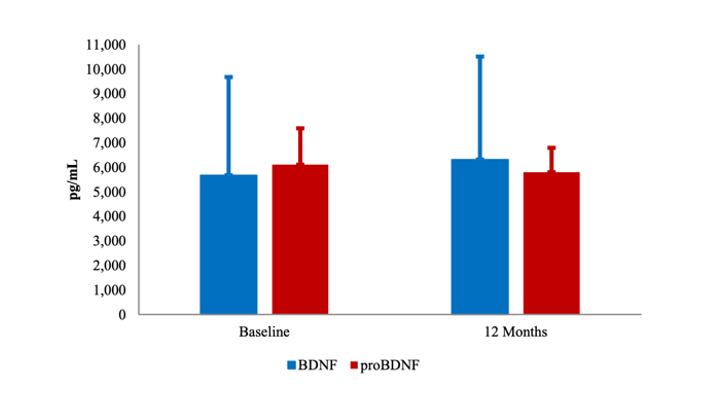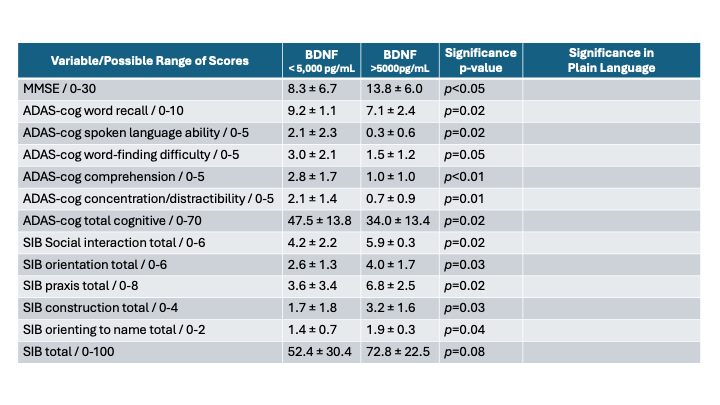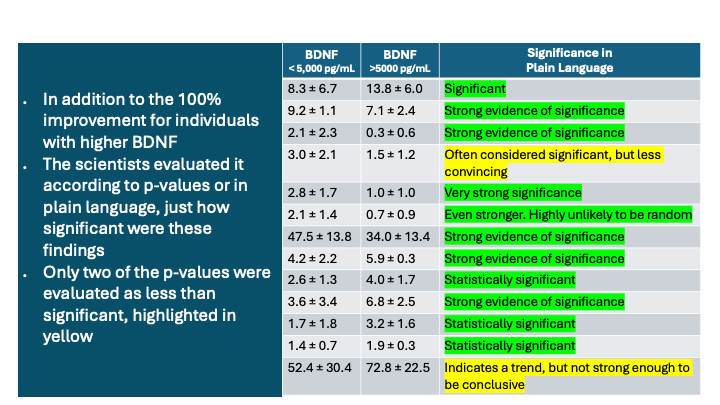Researchers wanted to find out if a special nutritional supplement—called aloe polymannose multinutrient complex (APMC)—could help people with moderate to severe Alzheimer’s disease by affecting something in the brain called BDNF. I’ll bring definition and clarity as we consider a study on this subject from 2017. Let’s first start with what BDNF is. It stands for Brain-Derived Neurotrophic Factor). BDNF helps brain cells grow, survive, and connect to each other and is important for memory and learning. Let’s start with our slides and get started.
First let me announce the study title: The effect of dietary supplementation on brain-derived neurotrophic factor and cognitive functioning in Alzheimer’s dementia
There are two forms of BDNF:
- ProBDNF – the “inactive” or less helpful form. It is thought to be harmful to brain cells and may signal cells to die. In essence it can produce opposite effects of Mature BDNF,
- Mature BDNF – the active form that supports healthy brain function.
The goal of this study was to see if this supplement that contains Acemannan, which is the Aloe Polymannose portion of the nutrient complex) could:
- Change the levels of BDNF in the body.
- Improve memory and thinking, in other words, contribute healthy cognitive function.
The study was done with 34 adults with Alzheimer’s disease. These adults consumed a teaspoon of the Acemannan-based nutritional supplement four times daily for 12 months. This same supplement was used in another study we covered at this link,
which also started with 34 Alzheimer’s patients. That is only coincidental. The other study was from 2015, this one is 2017.
- Their BDNF levels were checked at the start and again at the end of the 12 month trial via blood samples.
- Additionally, and this is important, their thinking skills were also tested at the start and again after 12 months.
- So, both chemical and mental results were evaluated.
What were the results of this study?
Chemically, BDNF levels didn’t change a lot overall, but they went in the right direction; there was only a slight increase making the researchers to conclude that the change was not large enough to be statistically significant. The ProBDNF also slightly decreased, and it too went in the right direction, but was also rated as not nessarily significant.
Although BDNF and ProBDNF shifted in a noteworthy direction, namely, an increase in BDNF and a decrease in ProBDNF, something important happened and it got the attention of the researchers.
- There was a stronger connection between higher BDNF levels and better thinking scores, on the cognitive side of things.
- The BDNF/proBDNF ratio; in other words the mature and good BDNF vs. less helpful proBDNF) was also connected to better cognitive results.
- This means that while the Acemannan-based supplement didn’t dramatically raise BDNF, people with better BDNF balance had better brain function.
But first, here is the graph that represents the chemical side of the study via blood samples. The Mature BDNF (the blue bar) started here and after 12 months increased to here. The proBDNF (the red bar) started here and after 12 months decreased to here. To repeat, though noteworthy, the numbers were not statistical significant in the eyes of the scientists.

However, remember, they also engaged testing of Cognitive function, to evaluate memory and thinking. So, after performing 13 different test variables, they also correlated it with the BDNF/pro-BDNF ratio (how much good vs. less-helpful protein is present)

They found that people with lower amounts of BDNF (less than 5000 pg/mL) performed worse on memory and thinking tests than those with higher levels. So, having more BDNF in your system might be a sign that your brain is healthier.
MMSE (Mini-Mental State Examination)
ADAS-Cog (Alzheimer’s Disease Assessment Scale – Cognitive Subscale)
SIB (Severe Impairment Battery)
But Let me clarify something. In both the MMSE and SIB tests if the score is higher than the column that represents the lower BDNF that means it is a better cognitive score. However, with the ADAS-cog battery of tests indication of better score is if the score goes down in comparison to the the lower BDNF column. So with all of that in consideration the question is “how many of the 13 tests gave indication of better scores when BDNF was greater than 5000 pg/mL. The answer? All of them. First, here is the scores of those individuals who had BDNF levels less than 5000 pg/mL, and in all cases, as I’ve mentioned those individuals who had above 5000 pg/mL all scored better, 100% of them.
This column rates the significance of these results. This will mean we take a short time out for a learning moment on what is called the p-value.
it is interesting to note that Scientists don’t just want to collect numbers — they want to know if those numbers really matter as they consider the experiments at hand.
That’s why they will ask:
“Are these results meaningful — or could they have just happened by chance?” Therefore the p-value system, (and p stands for probability) which in plain language for non-scientists might be interpreted as
- “Highly significant”
- “Significant”
- “Not significant” Or other variations

There’s no drama here — it’s just about being honest.
Studies can show interesting results, but not all of them hold up under closer inspection.
That’s why scientists take a few extra minutes to ask, “Is this just a coincidence, or is it something we can count on?”
They aren’t just chasing numbers — they’re chasing truth.
And as a way to give plain language to the p-value column I have taken the liberty to add another column that might give us a better feel here,, for what that is all about.
So in addition to the 100% improvement for individuals with higher BDNF the scienctists evaluated it according to p-values or in plain language, just how significant were these findings. You’ll see here that only two of the p-values were evaluated as less than significant, highlighted in yellow. One says, “Often considered significant, but less convincing;” and the other is “Indicates a trend, but not strong enough to be conclusive.” But with both the BDNF and the p-value on the table for consideration the scientists were still able to say in the scientific study that the results suggest that the Acemannan-based nutritional supplement might help improve cognitive function (how well someone thinks, remembers, and solves problems), and this improvement may be related to changes in BDNF and proBDNF—important brain chemicals.

And for the record, the researchers acknowledged the limitations of their study saying
- They didn’t track everything that could matter.
Included here are participants eating patterns, how active they were, or whether they were feeling depressed or anxious. It also didn’t measure how much help they were getting from their caregivers. - The person testing the memory knew who was in the study.
The psychologist who gave the memory tests knew which participants were getting the supplement, which can sometimes affect how a test is scored (even if unintentionally). However, this psychologist was testing people for many studies, so any bias would have likely been the same across all patients. - There weren’t many people in the study.
A bigger group would give stronger, more reliable results and help us understand if the supplement works for different types of people.
- People were allowed to take other medications.
This was necessary because stopping medication for Alzheimer’s would be unethical. However, those medicines might have influenced the results too.
- At the end of the study, people who had higher levels of BDNF did better on tests that measured memory and thinking skills. The supplement didn’t cause a big change in BDNF levels, but it may have helped the brain use BDNF more effectively.
What Did the Study Show, and What’s Next?
This study is important because Alzheimer’s disease (AD) is hard to treat, and most current treatments only reduce the symptoms, not the actual causes of the disease.
The results from this study suggest that the dietary supplement APMC, with its Acemannen core, might help improve cognitive function (how well someone thinks, remembers, and solves problems), and this improvement may be related to changes in important brain chemicals in BDNF and proBDNF.
But, the researchers say we need more studies with:
- More people
- More frequent testing
- Longer timeframes
This would help us better understand how the supplement works in the brain, and possibly reveal new ways to fight Alzheimer’s at its root—not just treat the symptoms.
I hope you will always be careful to maintain good works to meet urgent needs and become heroes to your generation.
0 Comments